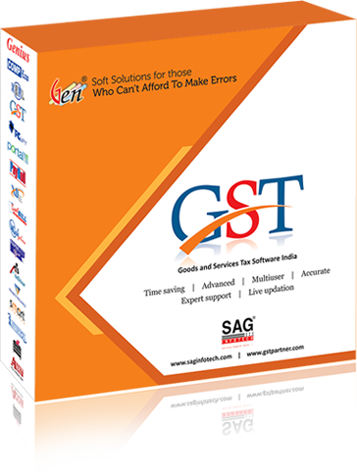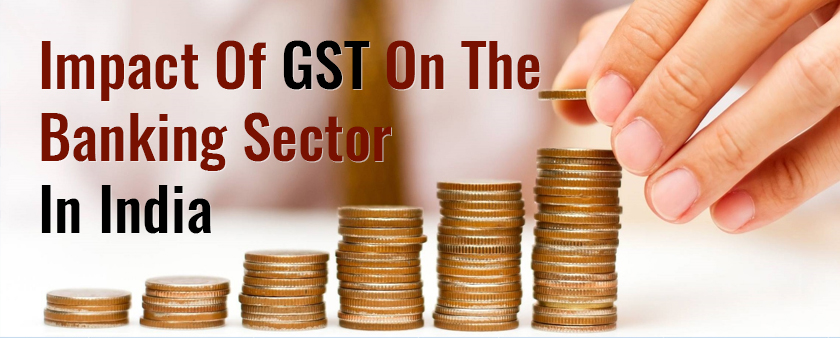The prevailing cascading taxation structure has been replaced by the GST regime, making the slogan of ‘One Nation, One Tax’ a reality. As expected it is making its impact on the each and every business sector including the service sector. In the service sector, specifically the financial services, NBFCs, and Banks, which is based on funds and insurance are deeply impacted.
In the light of the operations given by banks and NBFC such as lease transactions, hire purchase, related to actionable claims, fund, and non-fund based services etc., GST compliance is expected to witness some difficulties in executing in these service sectors. In short, we can say that the impact of GST on the banking sector in India is going to be adversely affected by this taxation system.
Under Model GST Law, the structure does not give much advantages or consideration to banks and NBFCs on comprehension of the kind of transactions made by them on a consistent and voluminous basis.
Contents
Some major issues being faced by the Banking sector pertaining to the GST Law have been talked below.
1. A numerous number of branches making registration process a big hassle:
As of now, NBFC, Banks with pan-India operations can release its service tax compliances through a solitary `centralized’ registration process. But now under GST, such Banks/NBFCs would need to get a different registration for each state where they work. In addition to this compliance burden about filing of returns has also expanded generously –
Notwithstanding enlistment, consistency trouble about documenting of profits has likewise expanded generously – as far as the periodicity of returns, number of return configurations and level of subtle details required in these returns.
2. Input Tax Credit advantages and disadvantages
Presently, Banks and NBFCs significantly pick the alternative of inversion of 50% of the CENVAT credit availed against inputs and input services while CENVAT credit on capital merchandise could be availed with no inversion conditions.
Under GST, 50% of the CENVAT credit availed against inputs, input services, and capital products is to be reversed which places them in a state of decreased credit of 50% on capital merchandise consequently increasing the cost of capital.
3. Assessment and Adjudication made troublesome
The assessment would be finalized by the respective state regulators under which the individual branch is enrolled. At the moment, every enlisted branch of banks and NBFCs must legitimize its position on changeability in the respective state and purpose behind using input tax credit in many states.
As under GST, more than one adjudicating authority will be included, every authority may hold an alternate opinion on the same fundamental issue. This inconsistency in opinion will delay the adjudication procedure. At present, a taxpayer is adjudged by a solitary adjudicating authority on an issue included.
Under GST diverse adjudicating authority may take an alternate view on a similar issue. Clearing up and managing with the difference of opinion given by the diverse adjudicating authority would be troublesome.
Are you looking for GST Software for Banking Sector?
What are you waiting for? Click here now
Issues pertaining to the revenue recognition under GST
1. Account Linked To The Financial Services
The place of supply will be the location of the beneficiary of services on the records of the supplier of services. In the digitized and centralized situation prevailing in India recognizing the condition of the location of service beneficiary will be very troublesome.
In situations where the service beneficiaries like professionals, manufacturers, merchants and different workers regularly move from one place to other looking for better opportunities, the service provider may have the diverse address like permanent address, current address, the address of correspondence and KYC address.
2. Non-Account Linked Financial Services
The place of supply of services here would be the area of service provider. This will again hit such organizations which are spread in the remote areas to build up their presence yet work and execute from a back office situated in some other state.
3. Actionable Claims
Actionable Claims don’t constitute as a service under Service Tax, and henceforth no tax is payable under the present regime. Under GST actionable claims are currently incorporated into the supply of goods. Services given from bills discounted to securitization will now be taxed as an impact B2C and B2B significantly.
SBI Releases New Rule On Saving Accounts After GST Implementation
One of the 50 largest banks in the world and the country’s largest bank, State Bank of India (SBI) has changed some of its rules and fees. If you also have an SBI account, then be aware of these rules as soon as to avoid any problem.
After the GST (goods and services tax) being implemented across the country from July 1, the charges which have been extended by the banks have been put on the customer’s side altogether. If taking into consideration the service charges, earlier the service tax used to be 15 per cent, but now after GST it is 18 per cent. In such a situation, the bank customer will now have to pay a higher price for the banking services.
SBI had made changes to the service charge of some cash transactions related to ATM withdrawals, including users of their mobile app SBI Bank Buddy, a few weeks ago, which has come into effect from June 1. Customers using the SBI Bank buddy app will be charged 25 rupees per withdrawal. It must be noted that the SBI bank’s Buddy App is a relatively new facility, which provides the facility to withdraw money from the ATM through the use of the bank’s mobile wallet.
Now in a new notification, after the rollout of the GST, SBI has said that withdrawal of money from ATM through the use of bank’s Buddy app, will now incur more charges. If you transfer money from SBI Buddy to your bank’s savings account, you will have to pay 3% + tax. SBI has said this through a press release.
Hope the above article will provide you all insights and help you understand the impact of GST on the banking sector in India. For any further assistance do comment below, your queries will be resolved at the earliest. Comments and views on the article are heartily welcomed.
Conclusion
With the desire of further subtle elements to develop, financial sectors confront a jar of worms regarding the way of transacting business, client profiles, services framework, IT frameworks and operation to catch the information at both front and back end. IT frameworks should be more cautious in terms of serving the purpose of solving the complexity related to GST.
The impact of GST on Banks and NBFCs will be to such an extent that operations, transactions, accounting, and compliance will be reevaluated completely.






